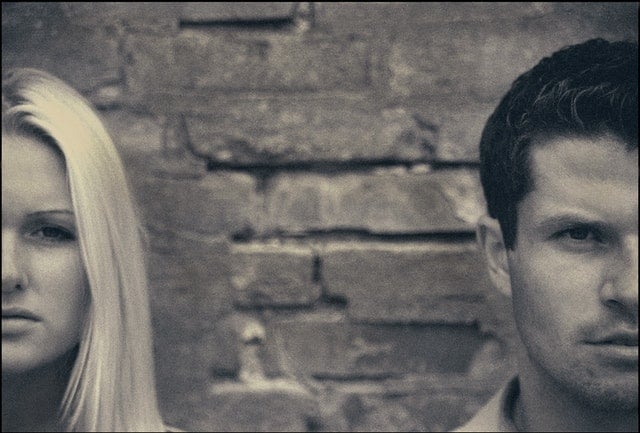
Denial was my bosom friend in childhood.
She was the Mary Poppins of the tools I unconsciously used as a little girl in order to normalize the dysfunction in my family.
When my parents fought, she’d coax the tips of my fingers into my ears. “There, there…” she’d croon. “Nothing to hear little one. Think about the daisies and bluebells you saw on your walk home. Think about the neighbor’s dog licking your hand through the fence. There…there…it will all be over soon.”
I’d tuck away the sharp words my parents used to slash one another to strips, shut out the muted thuds, and crashes beyond closed doors. I’d disappear inside the magic of fairy tales about princes and princesses and happily ever afters; hum my way through wordless meals around the kitchen table.
The role of denial is to protect us from having to feel the impact of negative experiences. In romantic relationships, we use it to overlook the flaws of our partners and alter our views of the flaws by turning them into positive attributes.
This is an unconscious behavior. We are in reaction to our childhood programming and in reaction to the world acting upon us. Our psyches and nervous systems are simply not mature enough to handle the pain of the truth.
Denial accompanied me into adulthood. I fell in love quickly, unable to recognize that my attractions were to people who were emotionally unavailable. I made excuses for their hurtful behaviors. I denied my own values. I masked my pain with alcohol, humor, and isolation. As long as I was in denial, I did not have to look at myself. I did not have to feel the trauma that had buried itself in the marrow of my bones. I did not have to admit that I didn’t love myself.
Denial is the fuel of codependency. As a codependent, I frequently denied that I needed help from others. When my friends or family pointed out the toxicity in my relationships, I’d go to any length to defend and minimize it. I’d unconsciously normalize emotional abuse, accepting it as a normal part of relating.
My own feelings in relationships were a wasteland. I defined myself by the feelings of others. I denied my values and needs in order to receive external love and validation of my worth. I used sex to gain approval and accepted sexual attention believing it was love.
I viewed the world as acting on me. I had lost the self with which to act upon the world.
And, as the saying goes: We don’t know what we don’t know until we know it.
Human relationships are arenas where we battle with our childhood trauma. It is where we get to meet ourselves and decide whether we want to heal once and for all or go on living in a land of make-belief.
Opening our eyes to denial is no easy task. It requires gargantuan courage to face our limiting beliefs about ourselves and our innate worth in the world.
The following are eight signs that point to denial of our emotional pain in a relationship.
1. Losing touch with ourselves:
Over time, I lost contact with my authentic self. I could not identify my needs. My values atrophied in the shadow of my partner’s. I no longer knew how to validate myself or see myself as an individual apart from the relationship. The relationship became the focal point of my life.
2. Unable to recognize abuse as abuse:
As a kid, I saw aggression, anger, yelling, crying; chaos, and drama as a normal part of relationships between adults. The emotional connection I received from both my parents was intermittent. Because I needed their love and attention to survive, I used denial to normalize their behavior.
Although as a young adult I told myself I would never stand for what my mother endured, I unconsciously attracted partners who in one way or another replicated my childhood experiences of relationship. Once again, needing my partner’s love, approval, and validation, I minimized or completely denied hurtful behavior. The times I did find the courage to point out incongruities in words and actions, I’d be met with pushback. I’d fold in on my courage, capitulate, and give my partner the benefit of the doubt. This made it possible to stay in the relationship.
3. Denying of our own internal experiences:
When I was acting out of full-blown codependency, I was clueless as to my internal experience. What mattered most was the experience and needs of others. When my partner felt good, I felt good. When he felt bad, I’d push aside whatever was going on inside me to make space for his stuff.
Most of my body and mind were rented out to my relationship. Where could I improve? What could I do to make it flow more easily? How could I approach difficult conversations as not to cause a shutdown? I wanted, above all else, for the relationship to be a success. I denied, denied, and denied my body’s radar system that was on high alert.
4. Minimizing red flags:
Recently, my extremely honest therapist pointed out to me that being in a relationship was the most important thing to me and it didn’t matter with whom. (Auch! That didn’t lend much credence to my discernment of partners.) My ego reared at that observation at first, but the longer I sat with it, the more I had to admit that she was right.
I minimized and explained away the behaviors that lacked respect, integrity, or support of my values, in favor of keeping the relationship alive. I made scarves of the red flags and hung them on my wall as decoration.
5. Normalizing cutting humor:
Let’s get real. When a joke is hurtful, demeaning, or disrespectful, it is not coming from a loving place no matter how it’s presented. I was told my partner’s humor was not for everyone. I denied my own heart when it recoiled and flinched at the punch lines. I told myself that since it’s a joke, he doesn’t really feel that way and the fault is mine for being too sensitive.
6. Excusing the silent treatment:
I am not talking about taking time out to reflect and come to our senses here. No, this is a cruel withdrawal of connection. It’s a painful lack of empathy. It’s stonewalling. When this happened, I felt like a little kid banging against a locked door, desperate for love and attention. Withdrawal of connection felt punishing.
Because I needed validation and love from my partner in order to emotionally regulate, I’d tippy-toe over eggshells, care-take, and accept the withdrawal of love as his process.
I would gaslight myself. I’d deny my feelings and devalue my needs for connection.
7. Taking responsibility for another’s transgressions:
In my last relationship, my then-partner and I had agreed that there would be no private friendships with ex-girlfriends. I had set this boundary early on. I felt in integrity with it. All throughout our relationship, I had intuitive nudges that something was off. When three years later, I learned that he had been secretly nurturing a private friendship and raised the issue, I was told: “You are jealous. You are controlling; I knew you’d react this way and that’s the reason I didn’t tell you.”
Instead of reminding him of our previously agreed-upon boundaries, I took on his judgment of me. I told myself I needed to loosen up. I needed to lean more heavily into trust. Maybe I was controlling. Maybe I was jealous. I denied my need for physical and emotional monogamy.
8. Doubting my intuition:
Throughout my last relationship, my intuition was on high alert. It highlighted incongruencies between my partner’s words and actions. I felt as though the ground beneath me was constantly shifting and I couldn’t maintain my balance. When I’d spend a few days on my own, my nervous system would calm down and I’d be able to right myself. When I’d return, I’d again feel the fluttery, sick feeling in my solar plexus.
I ignored it. I wanted to be in this relationship no matter what and that meant I had to deny my body’s communication system. I lived in a constant state of flight, fight, or freeze. By the end, I carried anti-anxiety medication with me everywhere, lest I need to shut down the deafening blaring and red lights flashing from my nervous system.
Would you be surprised if I told you that every one of my intuitive suspicions turned out to be true?
Through recovery from codependency and hours of therapy, I have learned the value of gentleness and kindness in the process of healing from denial. I no longer beat myself up for the length of time I had spent in denial of my emotional pain. Today, my eyes are wide open. I thank denial for keeping me safe in childhood. I give it a medal for turning my eyes away from situations that no child should have to experience as reality.
Denial has no place in my adult relationships. I release it from its role as caretaker and protector. I replace it with integrity, courage, honesty, and vulnerability, the cornerstones of healthy relationships.











Read 14 comments and reply